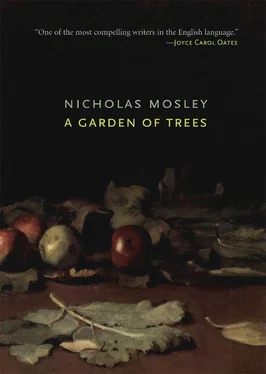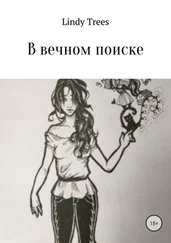Marius had come out after me. “Don’t worry,” he said.
“Worry?” I felt sure I was mad. It was extraordinary how Mr. Palmerston had disappeared so quickly.
“There is nothing to worry about.”
“Of course there is nothing to worry about!” I was furious that he should know how much it meant to me.
“I’m sorry,” he said.
We began to walk aimlessly away from the restaurant. “Have you paid the bill?” I said.
We walked again. The afternoon was running like a defeated army. I could not imagine why I had felt so confident in the night.
“You find all this odd?” he said.
“Yes,” I said. Annabelle and Mr. Palmerston had run, but it was I who had been defeated. Marius maddened me.
“It is of no significance,” he said.
“What isn’t?”
“Mr. Palmerston. He does things like that. I thought it might seem peculiar.”
“Not a bit.”
“Good. He is emotional, you see, not like an Englishman. I expect he has gone to pray for you.”
“To pray for me.”
“Probably. You talked about intercession.”
“This is crazy,” I said. Then, remembering Annabelle and Father Manners, “You talk of Mr. Palmerston as if you were ashamed of him.”
“Do I?” He seemed surprised.
“Yes. Why don’t you want me to worry?”
“Because it does no good.”
“What do you mean by good?”
“There are others who do the worrying,” he said.
“Do you realize that everything you say seems insane?” I said.
“Probably. I am not good at talking.”
“What are you good at?”
“Not much,” he said, smiling.
I remembered the time before when I had attacked him. Then we had been passionate and something had come of it. Now we did not seem to be hearing each other at all. Marius was full of a cheery humility that made communication impossible. He was like a knowledgeable schoolmaster trying to pretend to be as stupid as his pupil.
“What do you mean by the others who do the worrying?” I said.
“I mean it’s no good being anxious about oneself.”
“I’m not, I’m anxious about you.”
“Thank you.”
I wanted to say, “You’re welcome,” but I thought he might take it seriously. Instead I asked, “Do you know how much you have changed?”
“I expect so.”
“Do you remember saying that the church was no good?”
“Yes.”
“And now?”
“I didn’t know anything about it then.”
“So everything that you said last year you would now deny?”
“No, I have just gone on from there, the seed grows slowly, and is often not discerned.”
“The seed that others are anxious about?”
“Yes,” he said. He seemed pleased.
“Now you’re like a gardening advertisement,” I said.
He still smiled. “We always talked in images,” he said.
“Did we?” I thought, suddenly, how awful we must have sounded. Then I remembered that to Annabelle, only an hour ago, I had argued that we had said the same things then as we were saying now. This was true of Marius, too. It was I who was contradicting myself. “I know that I am crazy too,” I said.
“That’s all right.”
“It’s not what you say that I don’t understand, it’s the way that you say it.”
“What way?” He again seemed surprised.
“So complacent. If you don’t worry about yourself how do you ever get anywhere?”
“By doing things. By worrying about others.”
“By being crafty?” I remembered Annabelle’s father.
“It is as if there was a war on. When you know there is a war you naturally act differently from the way you would act if you didn’t. It is useless worrying about yourself in a war.”
“What is this war?”
“What we have always talked about. What we have always fought in, too, I think, except that once I didn’t know what we were fighting. Now I do and I see things in terms of it. Perhaps that is why I sound odd.”
“Yes. Soldiers never know why they are fighting.”
“Don’t they?”
“They treat everyone as if they were already dead.”
“Perhaps they do.” His eyes flashed at me.
“As if they were dead themselves,” I said.
We had by this time reached the door of Alice’s house. On the steps he stopped, as if he had remembered something. He still had the knowledgeable look on his face. “I forgot,” he said. “Annabelle is with Alice this afternoon.”
“Annabelle?” I said. I wondered if he would not go in because I was there. I felt that he was even capable of knowing what had happened between Annabelle and me that morning. Then I remembered what had happened between her and him. “What is Annabelle doing with Alice?” I said.
“What? Just seeing her. I don’t think I should go in at the moment, perhaps.”
“All right,” I said. We walked away again. I was beyond even being surprised at his calmness about Annabelle, although I felt, with a shock, that there was something uncanny about it.
“I wonder if you would be very kind and do something for me,” he said.
“Of course.” He seemed embarrassed, and I thought he was going to ask me something about Annabelle.
“I wonder if you would very kindly put me up in your room for a short while until I go home. I remember staying with you before, and I will only be sleeping there.”
“Of course,” I said. “You are leaving Alice’s?”
“Yes, I think so.” I did not ask why. It seemed extraordinary that he should not then have preferred to go to a hotel. “That is really very kind of you,” he said.
We stopped. I felt that I should leave him, but there was an awkwardness that held us. “You are going away soon?” I said.
“Yes. I saw in the papers to-day that there has been trouble in my island.”
“Trouble?”
“Rioting. I must get back for it.”
“Will we ever see you again?”
“I hope so,” he said.
“You all seem to be intent on killing yourselves.”
“Didn’t we say a long time ago that we were already dead?” he said, flashing his eyes again at me.
I said good-bye to him. As I turned to go he stopped me; and then, almost formally, with great embarrassment again, he said, “I must thank you for what you did for my wife before she died, you cannot know how much it meant to us, I am sorry I have not said this before to you, but I want to thank you now and tell you how important I think it was. Perhaps I have to thank you for many things.”
“No,” I said. “No.” I found myself as embarrassed as he.
“That is why I tell you not to worry,” he said.
He turned to go. I did not understand him, I did not know why I should not worry, but I was filled with such a peculiar remorse that I found myself running after him, saying, “Marius, tell me, am I a lunatic?”
“No,” he said, “surely, I don’t think so at all.”
When I got back to my room I found a message from Peter asking me to ring him up. I did so. He was out.
I sat on the edge of the bed. I thought: It would have been easier if Marius had said I was mad.
All confidence had gone. I could not remember it. Marius had talked about a war, and if there was war then I was a refugee and not a participant. I was lost, bewildered — a man wandering up a road with his belongings left behind him.
The road was crawling as if with ghosts. The armies went past, heedless, in a different direction. What war? The war between good and evil, light and darkness — was there really a world of which I knew nothing? A world in which a war was being fought by people to whom it was the only reality, who marched and acted and who in the intervals could afford to be frivolous because frivolity is part of war, the jokes of serious people are part of their armoury. If the war was true, the world of which I knew nothing, then I could forgive them their jokes. But I was still a fugitive, in the wrong direction.
Читать дальше












